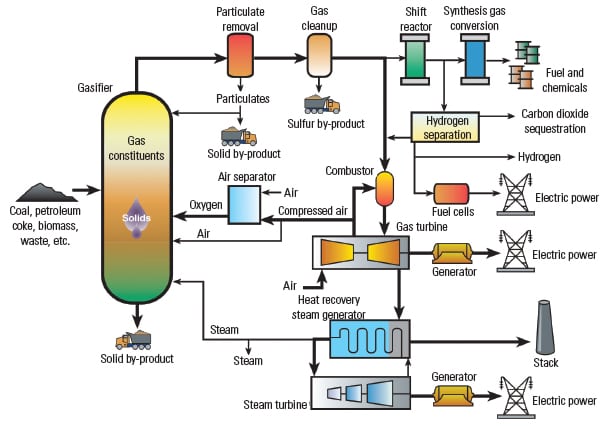DOE Poised to Pull Out of Texas Clean Energy Project
The Department of Energy (DOE) is ready to end its involvement with the Texas Clean Energy Project (TCEP), a carbon capture, utilization, and storage (CCUS) facility under development in west Texas, a move that would effectively shut the project down, according to its backers.
Along with FutureGen, Hydrogen Energy California (HECA), and NRG’s Petra Nova project, the TCEP is one of a number of CCUS projects the DOE has backed over the past decade or more in an attempt to bring the technology to economic viability. But one after another, most of the DOE-backed initiatives have failed. The DOE pulled out of FutureGen in February of 2015 and HECA last July.
TCEP, an approximately 400-MW integrated gasification combined cycle plant, would capture up to 90% of its carbon dioxide emissions as well as other coal combustion byproducts to produce fertilizer and CO2 for enhanced oil recovery (Figure). The ambitious project has been hailed by some as the future for coal generation, but the costs loom large: Most recent estimates put the total price tag for TCEP at nearly $4 billion.

The DOE committed $450 million toward funding TCEP, of which $116 million has been spent. But the project has repeatedly missed deadlines for advancing development, causing some of its private-sector backers to reconsider. Now, the DOE is ready to back out as well.
According to a report in InsideClimate News, the DOE has asked Congress to zero out the remaining $240 million in funding for TCEP in its 2017 budget request. This comes after the department inspector general’s office issued a scathing report in April saying the DOE had continued to pour money into the project despite the missed deadlines and the absence of any guarantees of success. In response to the report, the DOE gave TCEP developer Summit Texas Clean Energy until May 13 to meet certain milestones or funding would be cut off. On May 13, however, the DOE extended that deadline another seven weeks, though without committing to any additional funding.
TCEP, while in danger of being terminated, is not quite dead because it still has strong support from Texas’s congressional delegation, in particular Rep. Lamar Smith (R-Texas), chair of the House Committee on Science, Space, and Technology. Smith and other Texas legislators have expressed concern to the DOE about TCEP’s fate and the potentially withdrawn funding.
The Senate energy and water appropriations bill for 2017, passed on May 13, granted the DOE request, rescinding authorization for the $240 million for TCEP. That bill has gone to the House for reconciliation with the House version, which does not rescind the funding but is not yet final.
—Thomas W. Overton, JD is a POWER associate editor (@thomas_overton, @POWERmagazine).